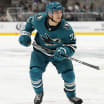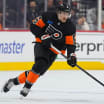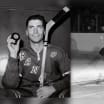Legendary hockey reporter Stan Fischler writes a weekly scrapbook for NHL.com. Fischler, known as "The Hockey Maven," shares his humor and insight with readers each Wednesday.
With the Stanley Cup Playoffs underway, Fischler looks back at the bitterly fought 1950 first-round series and it's unexpected hero, Detroit Red Wings defenseman Leo Reise, Jr.
Red Wings had unlikely playoff hero after Howe injury in 1950
Defenseman Reise scored two overtime goals in semi-final series against Maple Leafs
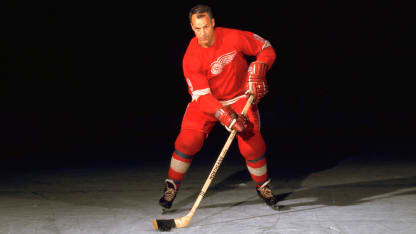
By
Stan Fischler
Special to NHL.com
There were many ways to describe Detroit Red Wings defenseman Leo Reise, Jr. when the 1950 Stanley Cup Playoffs got underway, but "offensive threat" was not one of them.
Notoriousy conservative, Reise was a dependable stay-at-home defenseman for Detroit, always guarding his zone when teammate Red Kelly frequently would embark on an end-to-end rush from his defense position.
Reise also was feared as one of the toughest body checkers in the NHL for a team that featured such rugged players as Ted Lindsay, Sid Abel and Gordie Howe.
"Leo was as tough as they come," Howe once told me.
The toughness was hereditary. Junior's father -- also Leo -- starred in the NHL despite the loss of sight in one eye as a youth. Unlike his son, Leo, Sr. was admired as a defenseman who was never shy about joining the play when a scoring opportunity presented itself.
"Our scouting reports had Red Kelly and Marcel Pronovost as the goal scorers among Red Wings defensemen," New York Rangers manager Frank Boucher said. "Leo was the kind of guy you wanted for defense, not offense, and for his toughness if games got out of hand."
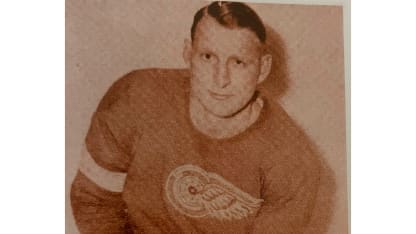
As it happened, the 1950 semi-final series between the Red Wings and Toronto Maple Leafs did get out of hand.
For starters, there was the heated Detroit-Toronto rivalry that began in 1936. That's when Maple Leafs boss Conn Smythe beat his Red Wings counterpart Jack Adams to signing Detroit farmhand goalie Turk Broda, a future Hall of Famer, who would win the Stanley Cup five times with Toronto.
In 1942 and 1945 the Maple Leafs defeated the Red Wings in two thrilling seven-game Final series. And by the 1950 playoffs, Toronto had toppled Detroit in 11 straight playoff games and eliminated them in three consecutive seasons, including two straight in the Stanley Cup Final.
If that wasn't enough, the infamous "Howe-Kennedy incident" took place in Game 1, a 5-0 Maple Leafs win.
"It happened late in the game with Toronto ahead 4-0," wrote author Ed Fitkin in his biography of Kennedy, 'C'mon, Teeder.' "Kennedy was carrying the puck and Howe cut across to check Ted. Catching a glimpse of Howe, Kennedy pulled up sharply and passed the puck ahead to Sid Smith. Meanwhile, Howe crashed into the boards face first.
"Gordie lay there, unconscious, blood streaming from his nose and eye. He seemed to be gravely injured. The Red Wings were badly shaken and upset."
Detroit accused Kennedy of using the butt end of his stick to injure Howe, though NHL President Clarence Campbell and referee Georges Gravel exonerated the Toronto forward. Howe later would agree with them.
But the damage had been done and the Red Wings sought revenge.
"It was a butt end," Red Wings coach Tommy Ivan said.
On the next play -- after Howe was taken to the hospital -- Abel slashed Kennedy across the ankle with a two-handed swing. Clearly, the Red Wings were out to punish Kennedy and they would get their man in Game 2 with 32 seconds left in the second period.
"Ted was a marked man on a night of bitterness," Fitkin wrote. "He came out of the game with a discolored eye and a cut lip. But not once had he backed down. Nor did he complain."
Cornered by newsmen after the Game 2 slugfest, Kennedy merely observed, "The game's over; they won it (3-1)."
Hockey historians endlessly have debated what effect the heightened intensity had on each team.
"The Red Wings rallied around the injury to Howe," wrote Eric Zweig in his Oral History of the Maple Leafs, "but Turk Broda kept [the Maple Leafs] in the series."
Broda and the Maple Leafs shut out the Red Wings 2-0 in Game 3.
"We need a hero," Adams said. "I still believe we have the team this year, even without Gordie."
But Adams never could have guessed Reise would step up as he did.
The Red Wings and Maple Leafs battled into a second overtime in Game 4 tied 1-1. Then Reise fired a shot towards the Maple Leafsnet only 38 seconds into the period.
Lady Luck was with Detroit. Reise's shot glanced off Toronto defenseman Gus Mortson and past Broda for the game-winning goal. The series was tied 2-2.
The Maple Leafs won 2-0 in Game 5 and the Red Wings remained alive with a 4-0 win in Game 6. That set the stage for a seventh and deciding game.
"Broda and [Red Wings goalie Harry] Lumley never were greater," was the way one Toronto reporter put it. "Sixty minutes of dogged combat failed to produce a goal."
Once again, the Red Wings and Maple Leafs battled into overtime.
After eight minutes of heart-throbbing action in overtime, the puck skimmed into the Maple Leafs end, eventually finding its way to Reise's stick at the blue line. His shot was not particularly hard, but it had eyes, passing one player after another.
"I never saw the (screened) shot until it hit the net and bounced out between my feet," Broda explained. "I looked down and there it was. Gone was the Cup and 1,000 beans!"
The most unlikely of Stanley Cup Playoff heroes, defenseman Leo Reise, Jr., had done it again, and the Red Wings advanced to win the Cup, defeating the Rangers in seven games.















